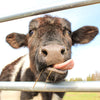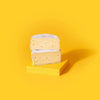Animal Welfare
By Richard Simpson
Jul 30, 2020

"Happy animals make happy cheese"
For a long time, Dairy farming and farming in general had a lot to answer for in animal welfare standards across the industries as a whole. The thinking in general was, bigger equals better, with no thought of the animals or the land in general.
Or so it would seem by the way the issue is reported on. There is one part of the dairy industry where this hasn’t been the case. Ever. The distinguishment here comes between the much and rightly maligned, big dairy, and the smaller farms. The differences have been written about in length in our article here. In small dairy, it has been understood for a long time that a happy animal produces better products and therefore can help create a demand on the higher end of the industry. Not to mention the conscience of the farmers who create bonds with their animals.
The criticisms of the dairy industry are necessary. Without criticism nothing would ever change or get better.
The three big ones are; bulls being slaughtered from birth, calves being separated from mothers and terrible living conditions.
Did you know that cheesegeek is the first carbon negative cheesemonger in the world?!
Male calves
One big criticism of the industry is that when male calves are birthed, they taken immediately to slaughter because there simply isn’t a need for them on dairy farms, and this practice is unnecessary cruel and wasteful.
There has been a lot of work done in this area, and many of our farms now have techniques that minimise or eradicate the chances of bulls being born.
Often in the dairy industry sexed semen is used to increase the ratio of female to males, seeing as females are reared for milk production. Animals should be treated as individuals and lead happy lives. Happy cows makes for happy cheese!
As far as waste is concerned, often on bigger dairy farms the bulls will be taken to slaughter and not used for anything which is incredibly wasteful as Becky on Hafod farm told us. On their farm in West Wales they their bulls produce high end veal. This way the calves are also involved in the herd for a time before they’re sent to production.
Calf separation
The practice of separating calves from mothers at birth was one born out of economic need. A suckling calf uses 2000l per cow adding up to roughly £500 of revenue losses. However lots of farms are experimenting with keeping calves with mothers for longer and selling their milk at higher prices to make up for losses.
At Hafod farm, they keep calves with mothers if possible. However when not possible they assign calves surrogate mothers, Becky described her farm as “like a community, if the calves are removed they’re never too far from their mothers on their relatively small farm. Cows live in herds and this community living keeps the cows and the calves happy”.
There’s a lot of research being done into when is best to remove calves from their mothers. Some suggest immediately, however thinking seems now to be longer equals better. Whichever way the coin falls though be confident in the knowledge that small farms are willing and able to respond to any research done and make the best possible choices for the welfare of the animals.
Living conditions
If you’ve read our article on regenerative farming, you’ll know there’s a big difference between small and large dairy farms. The videos you see of cows being packed in like sardines are filmed at the latter.
At these farms, animals often get little to no outdoors time. As previously mentioned, the smaller farms that produce artisan cheese in the UK more closely resemble the idealistic image of cows grazing in large fields where in reality, indoor time is more marginalised.
Our promise
You might be saying after this, "great, I'm glad that all of this work is being done, but what is it you're doing?". cheesegeek, as you can probably tell, is committed to running in the most ethical way possible and continue to encourage these progressive practices. We won't ever put a cheese in a box where ethical farming or sustainable practices aren't being used and worked on.
The artisan cheese industry is an incredibly progressive industry that's been built on self criticism and awareness, particularly in the last few years. Endless time, money and effort has gone into making farms the best possible place for animals and the environment. Long may that continue.


